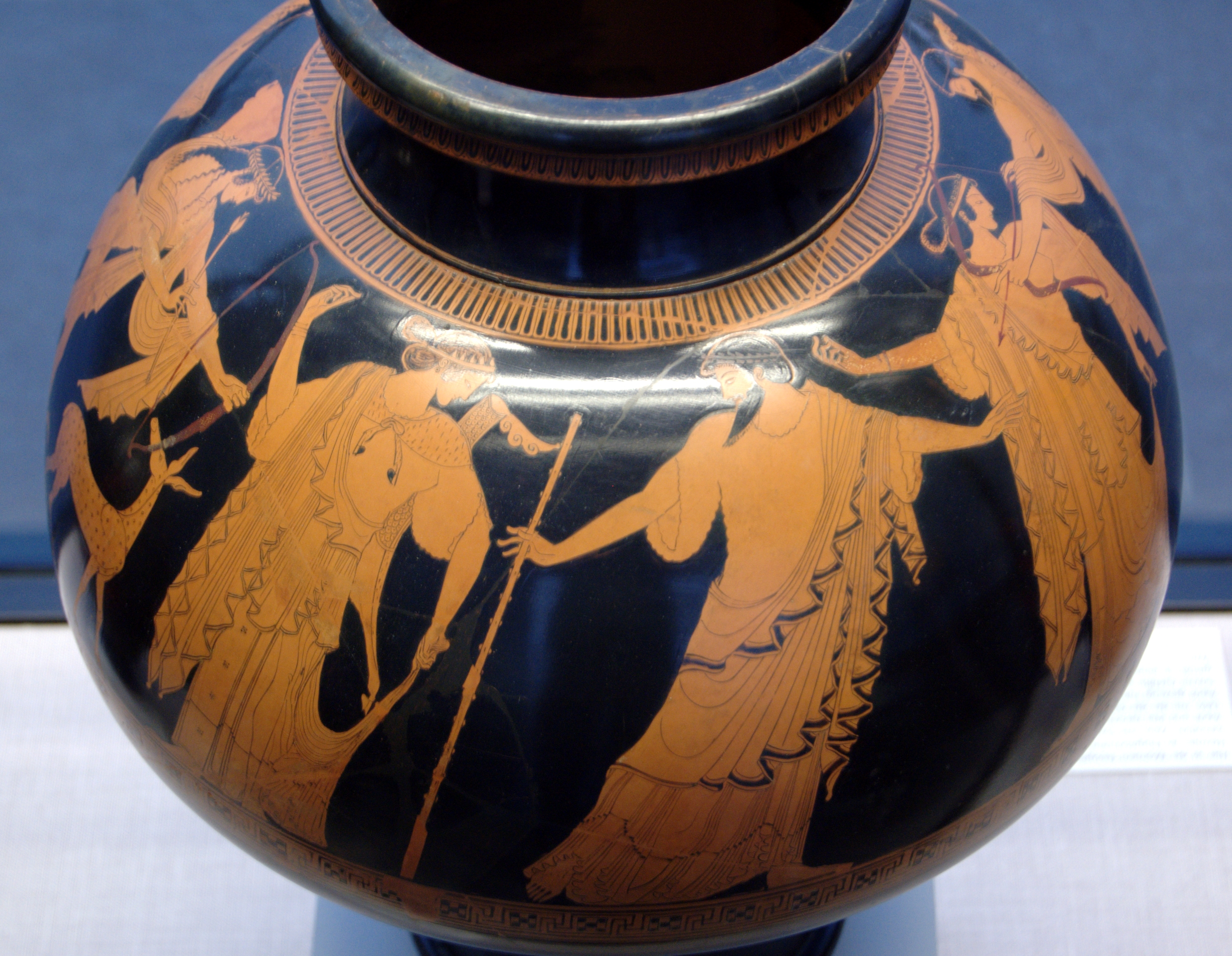.

Idas and Marpessa are separated by Zeus from Apollo (left, not visible): Attic red-figure psykter, by Pan Painter, ca. 480 BC, found at Agrigento: image by Bibi Saint-Pol, 7 September 2010 (Staatliche Antikensammlungen)
It wasn't by chance that Marpessa preferred Idas over Apollo,
despite her passion for the god, despite his incomparable beauty --
the kind that made myrtle tremble into blossom as he went by. She
never dared raise her eyes above his knees.
Between his toenails and his knees, what an inexhaustible world,
what exquisite journeys and discoveries between his toenails and his knees. Still,
at the ultimate moment of choice, Marpessa lost her nerve: What would she do
with a bequest as grand as that? A mortal, she would grow old one day.
She suddenly imagined her comb with a tuft of white hair in it
left on a chair beside the bed where the immortal one would rest shimmering,
she thought also of time's fingerprints on her thighs, her fallen breasts
in front of the black metal mirror. Oh no -- and she sank as though dead
against Idas' mortal shoulder. And he lifted her up in his arms like a flag
and turned his back on Apollo. But as he left, almost arrogantly,
one could hear something like the sound of cloth ripping (a strange sound):
a corner of the flag was held back, trapped by the god's foot.
despite her passion for the god, despite his incomparable beauty --
the kind that made myrtle tremble into blossom as he went by. She
never dared raise her eyes above his knees.
Between his toenails and his knees, what an inexhaustible world,
what exquisite journeys and discoveries between his toenails and his knees. Still,
at the ultimate moment of choice, Marpessa lost her nerve: What would she do
with a bequest as grand as that? A mortal, she would grow old one day.
She suddenly imagined her comb with a tuft of white hair in it
left on a chair beside the bed where the immortal one would rest shimmering,
she thought also of time's fingerprints on her thighs, her fallen breasts
in front of the black metal mirror. Oh no -- and she sank as though dead
against Idas' mortal shoulder. And he lifted her up in his arms like a flag
and turned his back on Apollo. But as he left, almost arrogantly,
one could hear something like the sound of cloth ripping (a strange sound):
a corner of the flag was held back, trapped by the god's foot.

Rape of Marpessa: Apollo (left, with Artemis) and Idas (right, with Marpessa) are separated by Zeus: Attic red-figure psykter, by Pan Painter, c. 480 BC, found at Agrigento: image by Bibi Saint-Pol, 7 September 2010 (Staatliche Antikensammlungen)
Yannis Ritsos: Marpessa's Choice, 28 October 1968, from Repetitions, translated by Edmund Keeley in Yannis Ritsos: Exile and Return, Selected Poems 1967-1974, 1985



5 comments:
Tom,
O temps, O Mors -- O Gods! The fact of that "comb with a tuft of white hair in it" seems to say it all (as Pan painter shows it). . . .
7.6
light coming into fog against invisible
ridge, flycatcher calling whip WEEDEEER
in foreground, sound of wave in channel
fact of physical form since
it was an object, not
“possibility,” some picture,
a prior optical event
grey white fog against invisible ridge,
shadowed green pine on tip of sandspit
The woods of Arcady are dead,. And over is their antique joy.
Yeats IIRC -- a talented chimp.
Tom -
It's a beautiful myth, beautifully re-imagined by Ritsos. I love the way that the human and the divine are both given their due, and their beauty - the 'shimmering' god, 'time's fingerprints on her thighs' - even as their irreconcilable otherness is acted out. Touched and torn by the gods. More fabulous new stuff - my education continues.
Those beautiful details Barry and Stephen have cited reflect the depth of Ritsos' commitment to re-vising and re-awakening the ancient parabolic vocabulary of the mythology of Greece. Keeping in mind that this vocabulary required revision in the hard light of the country's modern predicament; and too that it provided a sort of subversive "language" which could be employed when open expression was proscribed.
(If the implication re. "woods of Arcady" would be to suggest that writing on mytho-historical themes is some kind of escapist indulgence, the immediate personal and political compositional environment of the poem might be noted. Ritsos had been a communist, had spent four years in prison following the civil war of the late 1940s, had been arrested after the April 1967 military coup and been deported a the prison camp at Yiaros, and from thence to another such camp on the isle of Leros. His health failing, he was shipped back to Athens for hospitalization, then remanded to his wife's home on Samos, and placed under house arrest there. It was in those not exactly Arcadian circumstances this poem was composed.)
I took this to bed with me in my mind and can only repeat and echo Barry's comment.
Post a Comment